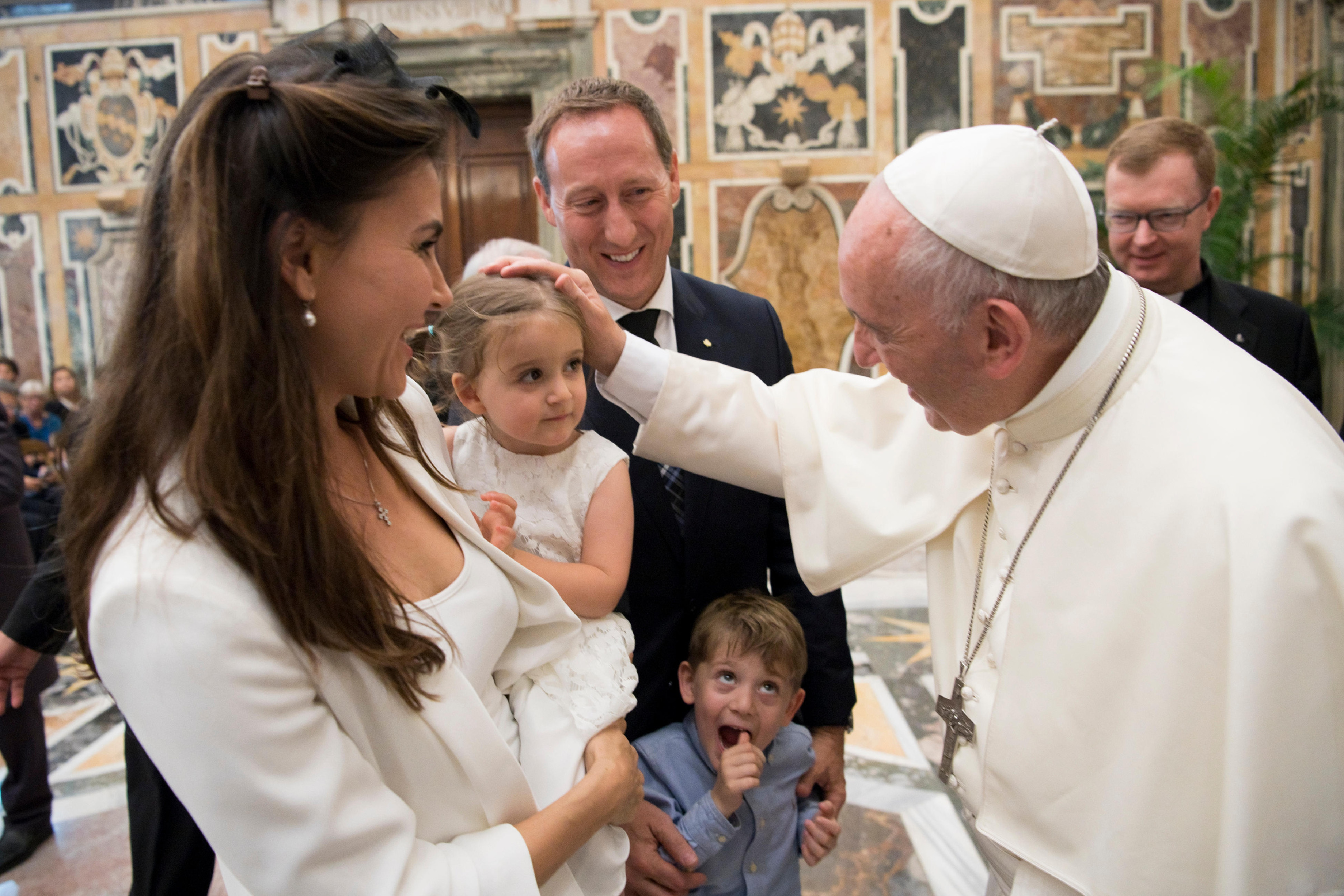
Pope Francis greets family members during an audience with participants in an international congress on protecting children in a digital world, at the Vatican Oct. 6. The pope pledged "to work strenuously and with foresight for the protection of minors and their dignity." (CNS/L'Osservatore Romano)
Acknowledging how often the Catholic Church failed to protect children from sexual abuse, Pope Francis pledged "to work strenuously and with foresight for the protection of minors and their dignity," including online.
"As all of us know, in recent years the church has come to acknowledge her own failures in providing for the protection of children: Extremely grave facts have come to light, for which we have to accept our responsibility before God, before the victims and before public opinion," the pope said Oct. 6.
Francis welcomed to the Vatican participants from an international congress on protecting children in a digital world. Hosted by the Pontifical Gregorian University's Center for Child Protection in partnership with WePROTECT Global Alliance, the congress Oct. 3-6 was designed to get faith communities, police, software and social media industries, mass media, nonprofits and governments working together to better protect minors.
At the beginning of the audience, Muireann O'Carroll, a 16-year-old from Ireland, summarized the congress conclusions "on behalf of all children."
Participants appealed to governments, church leaders and tech companies to do everything possible to remove online images of children and young people being sexually abused, identify and help those children, and end cyberbullying and "sextortion," which is using sexual images to blackmail someone. They also asked people involved in health care to increase the training needed to know when a young patient is being abused and how to help them.
Francis told the group that as a result of the "painful experiences" of seeing some of its clergy abuse children, but also as a result of "the skills gained in the process of conversion and purification, the church today feels especially bound to work strenuously and with foresight for the protection of minors and their dignity, not only within her own ranks, but in society as a whole and throughout the world."
The 80-year-old pope said that with the explosive growth of digital technology, "we are living in a new world that, when we were young, we could hardly have imagined."
"If, on the one hand, we are filled with real wonder and admiration at the new and impressive horizons opening up before us," he said, on the other hand its quick and widespread development has created new problems.
"We rightly wonder if we are capable of guiding the processes we ourselves have set in motion, whether they might be escaping our grasp, and whether we are doing enough to keep them in check," Francis told the group.
The "extremely troubling things on the net," he said, include "the spread of ever more extreme pornography, since habitual use raises the threshold of stimulation; the increasing phenomenon of sexting between young men and women who use social media; and the growth of online bullying, a true form of moral and physical attack on the dignity of other young people."
In addition, he said, there is the phenomena of sextortion and the solicitation online of minors for sexual purposes, "to say nothing of the grave and appalling crimes of online trafficking in persons, prostitution and even the commissioning and live viewing of acts of rape and violence against minors in other parts of the world."
"The net has its dark side -- the 'dark net' -- where evil finds ever new, effective and pervasive ways to act and to expand," the pope said. "The spread of printed pornography in the past was a relatively small phenomenon compared to the proliferation of pornography on the net."
The problem is huge and global, the pope said, and no one should underestimate the harm children and young people face.
"Neurobiology, psychology and psychiatry have brought to light the profound impact of violent and sexual images on the impressionable minds of children, the psychological problems that emerge as they grow older, the dependent behaviors and situations, and genuine enslavement that result from a steady diet of provocative or violent images," he noted.
"The spread of ever more extreme pornography and other improper uses of the net not only causes disorders, dependencies and grave harm among adults, but also has a real impact on the way we view love and relations between the sexes," he said. "We would be seriously deluding ourselves were we to think that a society where an abnormal consumption of internet sex is rampant among adults could be capable of effectively protecting minors."
Advertisement
While the internet has given people greater access to information and a vehicle for self-expression, it is not simply "a realm of unlimited freedom" without consequence, the pope said. The freedom of the internet "also offered new means for engaging in heinous illicit activities," often with children as their victims.
"This has nothing to do with the exercise of freedom," Francis insisted. "It has to do with crimes that need to be fought with intelligence and determination, through a broader cooperation among governments and law enforcement agencies on the global level, even as the net itself is now global."



